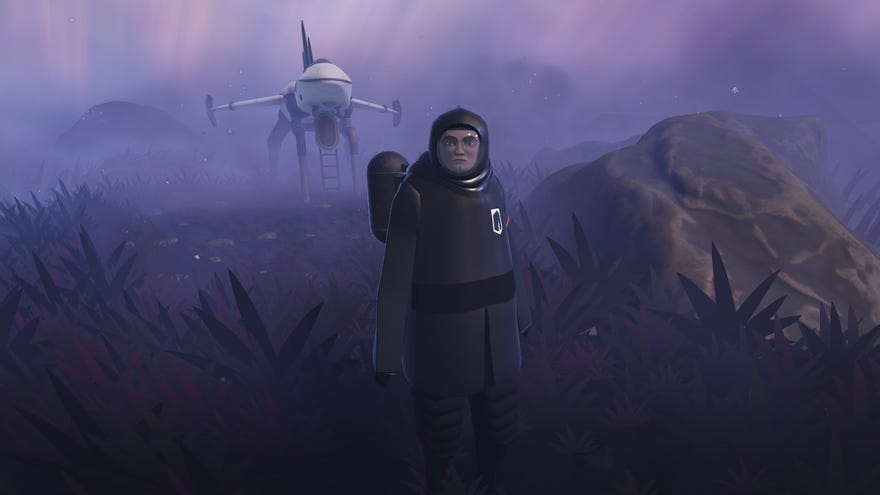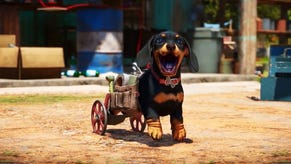Jett: The Far Shore's fictional language started life as gibberish choral music
"I felt like an archaeologist digging up this language that doesn't exist"
Lots of good sci-fi has made up languages, but I don't think many could claim their fictional languages were developed through song. Enter Jett: The Far Shore. It's an upcoming interstellar adventure made by Sword & Sworcery developers Superbrothers with Pine Scented Software, in which a team of scouts take off in their jetts to explore an uncharted planet. Better yet, it features its very own language that sound designer Priscilla Snow developed after finding meaning in the gibberish words she used to form the game's music.
While the initial plan was never to have their own in-game language, the Jett team now have a dictionary around 2000 words strong, and I had a chance to talk to them about how it all came to be.
"We didn't want Jett's story to be recognisably the world we know," creative director Craig Adams tells me. "From the start, there was always this idea of a planet like Earth, but something got scrambled and the societies didn't pan out exactly as we know them today. What does that space program look like? And what motivates those people?"
They wanted a relatable-enough experience where characters were grounded, and not too cartoon-ish. But as the ideas for Jett became more and more ambitious, one battle the devs chose not to fight was voice acting.
"Had we gone down that road, not only would that complexity have overwhelmed us, but we would've been back in that world making a snappy English script that would've lost some specialness," Adams explains.
Now, creating an entire fictional language is also a pretty ambitious undertaking, but it wasn't part of the initial plan. At first, Adams brought in a couple of friends, one who speaks Arabic and one who speaks Inuktitut, and had them record a number of lines that the devs could play with.
"What we had as temporary coverage was a bunch of Arabic and a bunch of Inuktitut which we put into blenders and rearranged," he tells me. "So you're hearing the dialogue, you're hearing the heart and soul of a person but in a language you can't perceive. And it was promising, I liked what we were getting out of it, but it had a limit to the quality, and so we had to develop what our next step was gonna be."
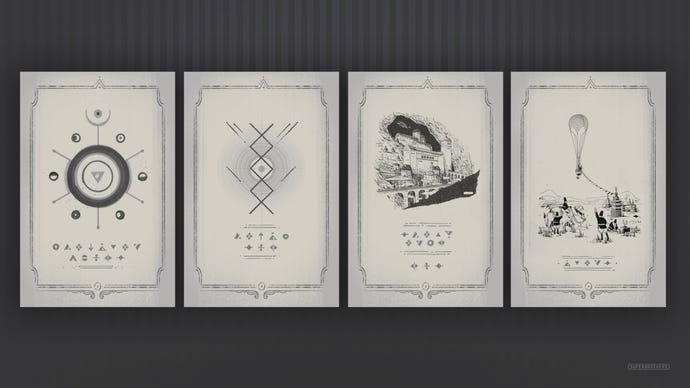
Meanwhile over in the sound department, the Jett team were looking into choral music. They wanted the characters to sing, so composer Andrew Rohrmann (who previously worked on Oxenfree) had been cooking up synthetic voices. But there was a limit to how much they could do with this sort of sound design, and yet again they needed someone to solve a pretty specific problem.
Enter sound designer Priscilla Snow. She came to the attention of Adams and Rohrmann because, not only was she familiar with the type of choral singing they were after, but she has family history with shape note and Sacred Harp singing, one of the oldest forms of American social choral music.
"I had gotten a message from Andy because he had seen a Tweet I had made about my relation to the shape notes singing master who's in my family," Snow tells me. "So he sent me this message and was like, would you be up for meeting?
"It was really cool because, even as recently as 2017, I was living in Arkansas and watching the behind-the-scenes music video for Oxenfree and thinking, 'How could I get this person to mentor me?' So getting the message was absolutely wild."
The two met and discussed the plans for Jett's music. Rohrman wanted the shape notes style, for the singing to feel old and steeped in tradition. The idea is for it to feel like people have been singing it for a thousand years, the sort of thing that's never been written down. So, Snow got to work. Now, the issue with wanting choir-like music in your game, is that it kind of needs lyrics to go along with it. Snow knew the current language situation however, and started doing her own research so she could create something that felt authentic.
Her first step was to come up with new soulfège notes. These are the notes that are used as a scale when singing - to someone who isn't musically trained, you might still recognise the traditional notes, "do, re, mi, fa, so, la, ti, do." But Jett: The Far Shore's singing was supposed to be in an unrecognisable language, so those had to go.
"I came up with 'vo, le, ga', instead of 'do, re, mi', and that was the beginning of the language," Snow says. "So, the scale in Jett's world is 'vo, le, ga, ni, ha, xi, me, vo'. When I wrote the song, there are all these parts that have people singing in that scale, and then you have people over the top doing solos that have lyrics."
"At the start, I was listening to the music on repeat and coming up with the melody line, and just started improvising words," she adds. "I sang one and it felt really natural. It made sense, even though it was like complete gibberish. I transcribed it first, then started to look for meaning in it. Like, what were they singing? Why would this word repeat?"
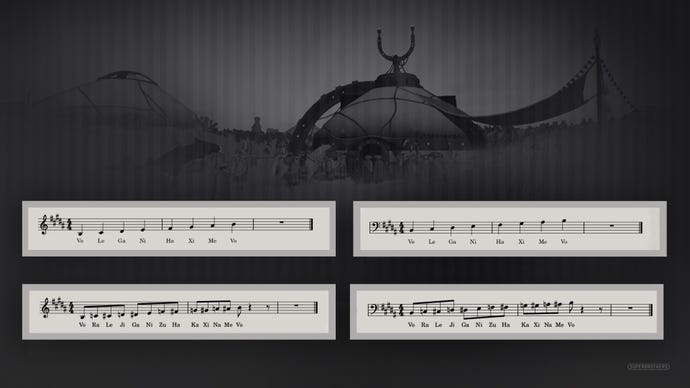
And so, almost by accident, Snow had begun crafting an entire language. Named "Volega" for the scale they'd created, Snow wasn't just making up interesting nonsense words to throw about, they wanted it to be consistent. They started a dictionary, which I'm told has now reached about 2000 words, and began recording prefixes, suffixes, and the foundation for what would eventually become Jett's language. After coming up with a good selection of words they knew would mean something, they finally turned them into a song.
"I recorded myself singing with myself, I did like nine different vocal parts in this massive choral piece," Snow tells me. "I used a modulator to drop my voice for the bass parts, I did some fake throat singing, I was all over the place. Then I sent it over, and was so nervous. Every time I send something over for a project I just have sweaty palms until I hear back. So I just hoped it wasn't too over the top.
"I was in a meeting not long after that, and someone said, 'It turns out you're actually fluent in the language of this game.'"
Not only had she created the exact sort of choral music the Jett team were after, but she had solved their issue of where to go next with this fictional language. She gladly agreed to continue working on it, and tells me she felt "like an archaeologist digging up this language that doesn't exist."
"I loved thinking about what language might sound like on Earth in a thousand years, or five thousand years, or on a version of our Earth that had a significantly different history, or fewer borders, more melding," she says. "Volega does follow more of a 'typical English' syntax, but this was mostly to make at least one aspect of the process a little simpler on my end while localising the script!"
Creating a unique fictional language was a big enough job without considering translating the game's entire script. The team knew they weren't going to be able to get every line translated and fully voice acted, so it became a case of figuring out which key moments needed to be properly thought-out and performed, and what they could do to fill in the gaps. Snow came up with the concept of fragments, where they would take parts of the fake language, jumble it up, and essentially make it more fake.
"I sat in all the voice recording sessions and it was really cool getting to hear people speaking this language, making it sound super convincing," Snow says. They worked with Nicolas Zhang and and an audio team at A Shell In The Pitt studio to help with a lot of the technical aspects. "We were recording right after the pandemic started, so they were going into the studio and putting on gloves and disinfecting mics, and there had to be a certain number of days between people going into record. I was watching over skype and I'd ping in and be like, 'Um, you're dropping the 'sh' sound in that part'. Occasionally I would read the line to help the actors understand it."
As for the fragments, Snow created a range of these with different moods and dialogue that could be slotted into place wherever they were needed. Initially, the devs had hoped they'd be able to randomly apply these to various points in the game, but Snow ended up touching every bit of this audio, specifically choosing fragments for the most appropriate sections.
"There are these larger spots of the game where things can happen in unpredictable orders, so you'll have lines of dialogue about some fauna you've come across, for example," Snow says. "We don't know if the player is going to encounter them, or when, and so we just wanted to get as much coverage as we could, and to kinda bring in some of the consistency from the fully translated scenes."
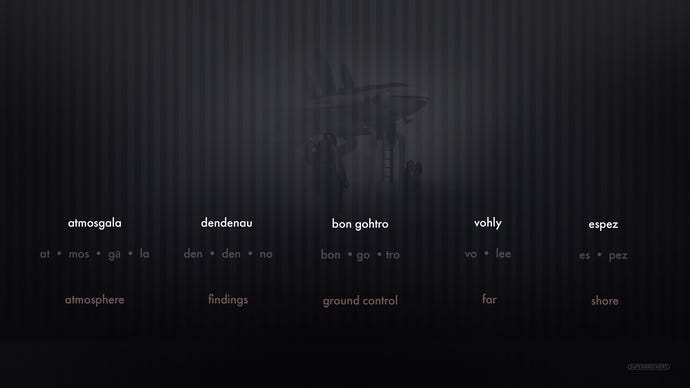
She tells me there was a list of vocab words that were important enough to be referenced across lots of conversations, like locations, names, and specific terminology. For example, you'll come across a mountain range in the game named "Tsosi Massif"'. They kept "Tsosi" as a recognisable Volega word, and translated the English "massif" to "joma", so that became "Tsosi Joma". Now, anytime that location sprouts up, you'll hear someone reference it.
"It creates this through-line," Snow explains. "It's like, I watch entirely too much anime, and I don't speak Japanese, but I'm immersed in it enough that I hear words and I start to notice phrases repeat. I wanted to give that experience to the player, where it's consistent and recognisable. So it's kinda helping to somewhat maintain that suspension of disbelief about the language."
"I hope I don't get emails from actual linguists telling me there's something wrong with it..."
Seeing as the Jett language is readable and speakable, I was curious if it'd be possible for people to learn it. Unfortunately I'm told that, while you might be able to grasp individual words, making up unique sentences might be a bit of a challenge, because the language was translated directly from scripts and songs.
"There's no way to speak it exactly," Adams explains. "You could take the dictionary and try, but it would sound different to what it does in the game. There are stretches of the game where the right ingredients have been put into a blender and reconstituted, and the goal was always for it to feel like a cohesive thing where you recognise a couple words, but the rest of it is more sentiment. I think it succeeds wildy in that goal, but if somebody wanted to speak it, I guess they would mark most of the dialogue in the game as not totally correct."
That certainly doesn't mean you couldn't try though. And hey, if your day-to-day life involves finding alien flora and fauna and zooming around in spaceships, you could probably pull lines straight out of the game.
I'm endlessly impressed by people who take on projects like these. Snow's enthusiasm for the language she's created is infectious, and I'm looking forward to hearing more in Jett: The Far Shore when it releases this October. What Ed's played of it so far sounds promising.
"I'm the kind of person that tries really hard to make things feel full of intent and specificity, I at least wanted the language to hold up to some amount of scrutiny," Snow tells me. "At the same time, I'm sitting there doing all of this like, 'I hope I don't get emails from actual linguists telling me there's something wrong with it'."
